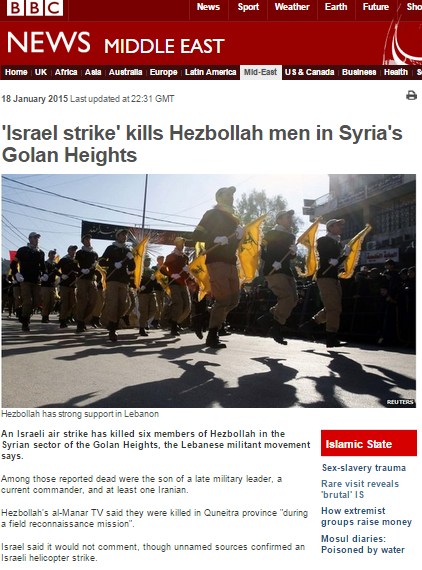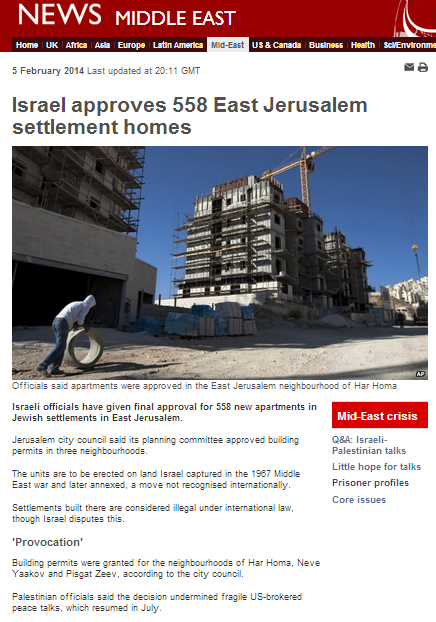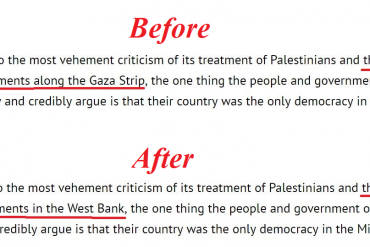On January 18th the BBC News website published a report titled “‘Israel strike’ kills Hezbollah men in Syria’s Golan Heights” which relates to an incident near Quneitra on the Syrian side of the Golan Heights earlier in the day. The report includes several features worthy of note.
With regard to the incident itself, the report gives a reasonable representation of the information which was available at the time of publication.
“An Israeli air strike has killed six members of Hezbollah in the Syrian sector of the Golan Heights, the Lebanese militant movement says.
Among those reported dead were the son of a late military leader, a current commander, and at least one Iranian. […]
Those who died include Jihad Mughniyeh, the son of a top military commander killed in 2008, and Mohammed Issa, a Hezbollah field commander, Hezbollah officials said.
One member of Iran’s Revolutionary Guards had died, the Britain-based Syrian Observatory for Human Rights said. Iran’s semi-official Tabnak news agency said several Revolutionary Guards had been killed.”
The Iranian news agency Fars has since confirmed the death of IRGC officer Gen. Mohammad Ali Allahdadi and a Lebanese source told AFP that in all twelve people were killed in the strike – six from Hizballah and six Iranians – although other reports have presented different information.
With regard to the key question of what a convoy of Hizballah operatives and Iranian Revolutionary Guards were doing near the border with Israel on the Syrian side of the Golan Heights, the BBC quotes the version of events promoted by Hizballah media.
“Hezbollah’s al-Manar TV said they were killed in Quneitra province “during a field reconnaissance mission”.”
It then adds:
“Israel said it would not comment, though unnamed sources confirmed an Israeli helicopter strike.
They claimed those targeted were conducting reconnaissance for a Hezbollah attack.”
However, whilst no attempt is made to provide readers with the relevant context of the cross-border attacks carried out by Hizballah in recent months, the article does inform them that:
“Israel has conducted several air strikes inside Syria since the conflict began, said to be aimed at preventing the transfer of stockpiles of rockets from the Syrian government or Iran to Hezbollah.”
The article notes that:
“The incident comes days after a warning to Israel by the Hezbollah leader, Hassan Nasrallah, that his forces might retaliate against what he called repeated Israeli strikes inside Syria.
He said his forces had been stockpiling weapons for such a confrontation and that these included long range missiles that could hit every part of Israel.”
Those quotes come from an interview given by Nasrallah on January 15th to Al Mayadeen TV in which he explained the ‘logic’ behind the statement highlighted in the BBC’s account, according to which a Lebanese terrorist organization backed by Iran is prepared to attack Israel because of that country’s perceived actions in Syria.
“A key ally of Syrian President Bashar Assad, Nasrallah, who has sent thousands of fighters into Syria to help defend the regime, said that Israeli strikes on Syria “target the whole of the resistance axis”, which includes Hezbollah, Damascus and Tehran.
“The repeated bombings that struck several targets in Syria are a major violation, and we consider that any strike against Syria is a strike against the whole of the resistance axis, not just against Syria,” he told the Beirut-based Arab news television. […]
Nasrallah said in the interview that Hezbollah was ready to fight a new war against Israel in Lebanon and renewed a threat to invade the Galilee region of northern Israel. Hezbollah fighters “must be prepared”, he said.
“When the resistance (Hezbollah) leadership… asks you (fighters)… to enter into Galilee, that means the resistance must be ready to enter into Galilee and to go even beyond the Galilee.””
Like much of the media, the BBC’s report focuses on one of the people reported killed.
“Jihad Mughniyeh is the son of Imad Mugniyeh, who was killed in a bombing in a bombing in Damascus in 2008. Hezbollah blamed Israel for the death, but Israel denied it.
Imad Mughniyeh was widely believed to be behind a wave of Western hostage-taking in Lebanon during the 1980s.”
Mughniyeh’s record of course included a lot more than hostage-taking as the Lebanese newspaper The Daily Star pointed out – but the self-styled ‘standard-settling’ BBC did not.
“Believed to be the mastermind of Hezbollah’s combat tactics, Mughniyeh was considered to be involved in the 1983 bombings of the U.S. Embassy and U.S. Marine and French peacekeeping barracks in Beirut, which killed over 350 people, as well as the 1992 bombing of the Israeli Embassy in Buenos Aires and the kidnapping of Westerners in Lebanon in the 1980s.”
The BBC’s descriptions of Hizballah throughout the report fail to note that it is an internationally designated terrorist organization (or even to mention the word terror) or that its ‘Al Manar’ TV station quoted by the BBC in this report was declared a Specially Designated Global Terrorist Entity by the United States Treasury and is also banned in several European countries.
“An Israeli air strike has killed six members of Hezbollah in the Syrian sector of the Golan Heights, the Lebanese militant movement says.”
“Hezbollah militants have been supporting President Bashar al-Assad in a four-year Syrian conflict that activists say has left more than 200,000 people dead.”
“Israel fought a 34-day war with Hezbollah, a mainly Shia group backed by Iran, in 2006.” [all emphasis added]
The caption to the main photograph used to illustrate the article states:
“Hezbollah has strong support in Lebanon”
At the bottom of the article appears an insert which likewise does nothing to enhance BBC audiences’ understanding of the real nature, record and agenda of Hizballah and of course makes no mention of the fact that according to assorted UN resolutions, it should have been disarmed years ago.
The link included at the bottom of that insert leads to the December 2013 version of the BBC’s profile of Hizballah which, as readers may recall, was amended to present a much softer picture of the terrorist organization than the profile it replaced by means of airbrushing Hizballah’s terrorist designation by numerous countries worldwide, its terrorist activities outside Lebanon, its involvement in the murder of Rafik Hariri and its role in the Syrian civil war and with no mention made whatsoever of Hizballah’s criminal activities around the globe.
Obviously BBC audiences will not be able to understand the significance and implications of terrorists and IRGC officers on Israel’s border as long as the BBC continues to fail to represent Hizballah properly.





